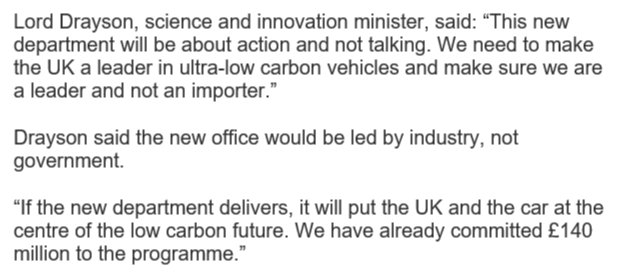While this blog is interesting and pessimistic for EV production in the UK, it doesn't paint the full picture.
Nissan benefited from a lot of funding to establish the Sunderland battery plant. Its decision to spin out its worldwide battery JV in 2018 as others were vertically https://twitter.com/LSEEuroppblog/status/1353607290151202818
Nissan benefited from a lot of funding to establish the Sunderland battery plant. Its decision to spin out its worldwide battery JV in 2018 as others were vertically https://twitter.com/LSEEuroppblog/status/1353607290151202818
integrating was bizarre, losing control of the most important component in the EV supply chain. It meant they were stuck at the 40 kWh capacity level as others in the segment went to 50 kWh and higher. While Nissan has had a 62 kWh model for two years, supply is extremely limited
and the 40 kWh model dominates sales. This is true globally, not just in Europe. So while the majority of Leafs would be compliant with RoO, the 62 kWh model would not unless Nissan convinced its supplier to establish production of that battery in Sunderland too. That was a
situation of its own past mistakes and not directly caused by brexit. If they have received a further £80m then they played the subsidy game well.
Meanwhile Stelantis' comments about Ellesmere Port also hide a legacy of unfortunate events going back a decade. At the launch of
Meanwhile Stelantis' comments about Ellesmere Port also hide a legacy of unfortunate events going back a decade. At the launch of
the Vauxhall Ampera in late 2011 / early 2012 it was stated Ellesmere Port would get EV production if the Ampera was successful, but lack of promotion and GM's underinvestment and eventual disposal of GM Europe to PSA meant this never happened. The latter's strategy to go full EV
with the Corsa and PHEV with SUVs leaves the Astra stranded in the middle, nevertheless if that changes then Stelantis procures batteries from LG Chem, Samsung and CATL, and all 3 have plants in Europe - thus RoO is not a problem.
JLR already has the i-Pace, but this is built in
JLR already has the i-Pace, but this is built in
Austria. Their battery supplier is LG Chem and again, should projects move closer to home they will still be fine under RoO.
BMW Mini in Oxford is reported to be using cells from CATL, so once more can be supplied from their new plant in Erfurt, Germany.
LEVC (taxis etc) are
BMW Mini in Oxford is reported to be using cells from CATL, so once more can be supplied from their new plant in Erfurt, Germany.
LEVC (taxis etc) are
sourcing their cells from LG Chem, so again can be supplied from Poland.
Toyota's batteries currently come from Prime Earth EV Energy co or Panasonic, both supplied from Asia. In standard hybrids the value is probably not enough to be a problem. However there previous focus on
Toyota's batteries currently come from Prime Earth EV Energy co or Panasonic, both supplied from Asia. In standard hybrids the value is probably not enough to be a problem. However there previous focus on
hydrogen means they don't have an agreement with a battery plant in Europe yet.
Honda in Swindon plan to close their plant for reasons not directly related to brexit. Their previous focus on hydrogen and the move away from diesel left it exposed to Honda's global contraction.
Honda in Swindon plan to close their plant for reasons not directly related to brexit. Their previous focus on hydrogen and the move away from diesel left it exposed to Honda's global contraction.
So the blog's claim "This is particularly challenging for EV production because the batteries alone, which are currently mainly imported from Asia or the US" is fundamentally untrue. What's more "transition to EV production is linked with a shortening of supply chains and a trend
towards co-location of battery and vehicle assembly" may be true in the case of Tesla, but so far no other OEM has fully embraced it - hence the viability of a project like Northvolt.
Carlos Tavares may have an ulterior motive sabre rattling over the 2030 ICE ban, but there is
Carlos Tavares may have an ulterior motive sabre rattling over the 2030 ICE ban, but there is

 Read on Twitter
Read on Twitter


